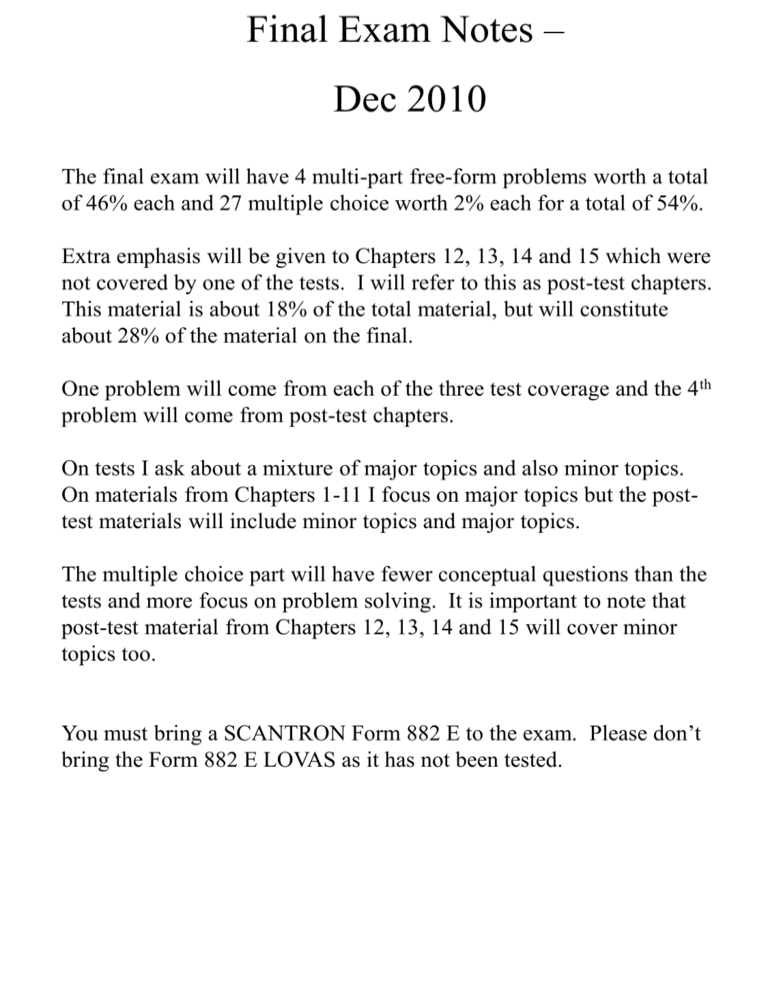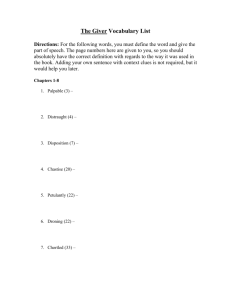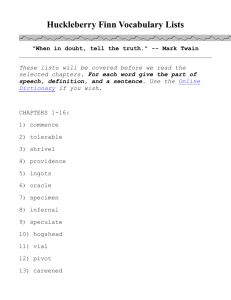Sources of Ch 12-15 practice questions
advertisement

Final Exam Notes – Dec 2010 The final exam will have 4 multi-part free-form problems worth a total of 46% each and 27 multiple choice worth 2% each for a total of 54%. Extra emphasis will be given to Chapters 12, 13, 14 and 15 which were not covered by one of the tests. I will refer to this as post-test chapters. This material is about 18% of the total material, but will constitute about 28% of the material on the final. One problem will come from each of the three test coverage and the 4 th problem will come from post-test chapters. On tests I ask about a mixture of major topics and also minor topics. On materials from Chapters 1-11 I focus on major topics but the posttest materials will include minor topics and major topics. The multiple choice part will have fewer conceptual questions than the tests and more focus on problem solving. It is important to note that post-test material from Chapters 12, 13, 14 and 15 will cover minor topics too. You must bring a SCANTRON Form 882 E to the exam. Please don’t bring the Form 882 E LOVAS as it has not been tested. Chapters 1-11 will have major topics Chapters 12, 13, 14 and 15 will have major and minor topics Sources of Ch 12-15 practice questions Chapter 12 was covered by almost all old test3’s with problems and some with multiple choice. Chapter 13 was covered by test 3 in summer of 2010 and 2009 including problems and multiple choice. The non-credit Assignment 13 in Mastering Physics covers Ch 14 and 15. The following files in the old test archive have questions from Ch 12-15, but the coverage differs. p243_exam_test4_practice.pdf p243_test4_2006_P.pdf The sections covered on the previous tests are listed on the website. The following sections will be included in the “post-test” material: Chapter 12: Sections 1, 2, 3, 4, 5, 6, 7, 8 (Skip 9) Chapter 13: Sections 6, 7, 8, 9, 10, 11, (Skip 1, 2, 3, 4, 5, 12, 13, 14) Chapter 14: Sections 1, 2, 6, 7, 8 (Skip 3, 4, 5 ) Chapter 15: Sections 1, 2, 4, 5 (Skip 3, 6, 7, 8, 9, 10, 11, 12) This material is about 18% of the total material, but will constitute about 28% of the material on the final. The Comprehensive part of the exam will cover “major” topics from all 15 chapters. The following minor topics will not be on the final: satellite motion, universal gravitation, impulse, stability and balance (9-4), Pascal’s principle, Archimedes Principle, Poiseuille’s Eqn. and the pendulum. You will not have worked-out problem on Bernoulli’s Principle but you could have multiple choice. Major topics from the post-test material include the ideal gas law, internal energy, heat engines and efficiency. The equation list for the final is on the last page. Please be on time for the exam. Students arriving late are not guaranteed extra time. If you arrive more than 15 minutes late, I will attempt to give you missed time minus 15 minutes. Those arriving in the first 15 minutes after the start time, will be given no additional time. Those arriving after students have started to leave will not be permitted to take the exam. You must bring a photo ID to the final– it will be checked as you leave. You must bring a photo ID to the final– it will be checked as you leave. You must take the exam in the section you are registered because each class will have a different “curve”. Students who take the wrong exam will: •Receive a temporary incomplete •Have a “penalty” subtracted from their grade for the final. I do not reveal the size of the penalty in advance. •Have the grade for the final “adjusted” for differences in the difficulty level of the two exams. This could be positive or negative. The equation list for the final is on the final page. v2 aR r v v0 at 1 x x0 v0 t a t 2 2 2 2 v v0 2 a ( x x0 ) F ma v v v 0 2 P PA PG P PA g h 1 K E mv 2 2 PE grav mg y WNC K E1 PE1 K E 2 PE 2 PE elastic 2 2 0 0t p mv t W F d cos Ffr k FN 2 P W 1 2 kx 2 Q A1v1 A2v2 F k x 1 t 2 0 2 2 P1 0 t 1 1 v12 g y1 P2 v22 g y2 2 2 v f v r aR 2 r L I I I hoop M R mr KErot 1 I 2 2 2 I I 0 0 m k T 2 r F I FT m/L v atan r f 2 I 1 1 T 2 k m x A cos 2 f t 1 I cylinder M R 2 2 Atmospheric Pressure = 1.01 x fn v vobs f ' f snd vsnd vsource Boltzman Constant k = 1.38 x 10-23 J/K Stefan-Boltzmann Constant σ = f BEAT f1 f 2 W/ m2 K4 PV n R T Ideal Gas Law Constant R = 8.314 J/mol K KE Avogadros’ Number Na = 6.022 x 1023 particles/mol Density of water = 1.0x103 kg /m3 Q T T2 kA 1 t l 1 liter = 1.00X10-3m3 W P V 3 NkT 2 Q e A (T14 T24 ) t U Q W W P V Area inside a circle = r2 Acceleration due to gravity = 9.80 m/s2 1 3 mv 2 k T 2 2 U Intensity at threshold of hearing = 1.0x10-12 watts/m2 Kelvin = 0C + 273 2L n I n I0 Pa 5.67x10-8 nv 2L 10 log 2 I sphere M R 2 5 105 P 4 r 2 e W Q QL Q H 1 L QH QH QH eideal 1 TL TH




